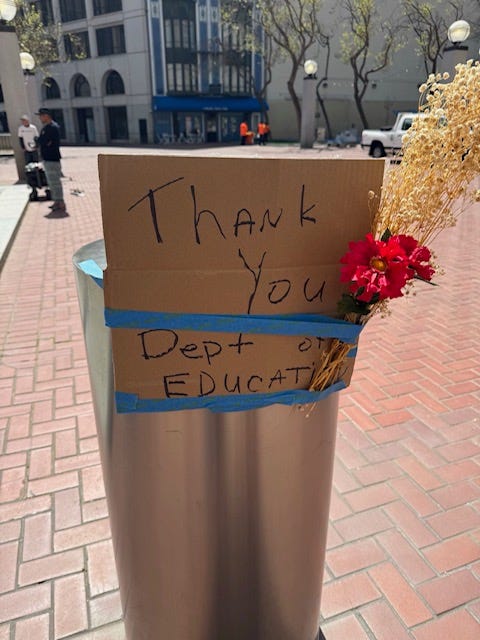Federal Department of Education cuts hit home
In this first-person essay, a (now former) attorney for the Department of Education, living in Sebastopol, talks about the agency he used to work for and why it's important
By Matt Wood
I wasn’t surprised when I received the email last month telling me that my job as a civil rights attorney at the U.S. Department of Education’s Office for Civil Rights was being eliminated. After all, the president had campaigned on eliminating the federal Department of Education and firing as much of the civil service as possible.
What surprised me was the response I received when I told other parents in Sebastopol about it.
A dad at a youth sports event told me he was “sorry about my job” but that it was important to “eliminate waste and fraud.”
I asked him what waste and fraud was occurring at the U.S. Department of Education, and how he knew about it. He responded that he didn’t really know about any, but that generally speaking, he didn’t think it was a bad idea to bring in “fresh eyes” to look everything over given “all the federal workers and all the money being spent” on education and kids still not doing well in school.
I didn’t respond and tell him that there are actually the same number of federal workers now as there were a generation ago, despite there being 50 million more Americans. And that there were already outside eyes reviewing the Department of Education’s efficiency (and that of all other federal departments), including the Government Accountability Office. I also didn’t explain that the federal government (until January 2025) had zero influence on school curricula, which are set by school administrators with guidance from the state. I also didn’t tell him what the Office for Civil Rights (OCR) did and what will happen if OCR is abolished, and why he should care.
So I am telling you instead.
Congress established the U.S. Department of Education in 1979, fresh on the heels of the social justice movements of the 1960s, and in response to calls for expanded federal funding in education and “national efforts to help racial minorities, women, people with disabilities, and non-English speaking students gain equal access to education.” Prior to that time, education-related programs and activities were housed in different federal departments, which made communication and coordination difficult.
The purpose of Congress’s effort was lofty: to ensure equal access to education for all Americans. Today, the Department of Education has many different agencies and offices, including the Federal Student Aid (FSA), the Institute of Education Sciences (IES), the Office of Special Education and Rehabilitative Services (OSERS), and my (former) office, the Office for Civil Rights. While they all do different things, these offices are united in trying to help students receive the best education possible.
Among these agencies, the Office for Civil Rights plays a unique and critical role: it ensures that institutions receiving federal financial aid—such as public school districts and nearly every college and university—abide by federal civil rights laws prohibiting discrimination based on disability (Title II of the Americans with Disabilities Act of 1990, and Section 504 of the Rehabilitation Act of 1972), sex (Title IX of the Education Amendments of 1972), race or national origin (Title VI of the Civil Rights Act of 1964), and age (the Age Discrimination in Education Act of 1975).
If a student, parent or educator believes that a school is out of compliance with one of these laws, they can make a complaint to OCR. Typical complaints include that a student with a disability’s Individualized Education Program (IEP) plan is not being implemented or that a school doesn’t have an adequate English-learner program or that there are inequalities between the girls’ and boys’ athletics teams or that a student is being harassed based on their sex or race and the district or university did not respond appropriately. OCR will respond to each complaint either by investigating and making a determination, or mediating, and/or providing information to the complainant and the school.
If the district or university is out of compliance with the law, OCR will enter into a resolution agreement wherein the school commits to fixing the issue, remedying the harm and taking steps to prevent it from recurring. OCR also provides technical assistance to schools about how to comply with the law and prevent discrimination from happening in the first place. And OCR does all this “for free.”
In 2024, OCR’s 560 attorneys in twelve regional offices received more than 22,000 complaints from students, parents and educators, and resolved more than 16,000 complaints from 2024 and previous years. Given the increasing number of complaints, the Office for Civil Rights needs more attorneys, not fewer. If the administration continues on its current path, however, the Office for Civil Rights will not respond to any complaints next year, because the Office for Civil Rights won’t exist.
What does that mean for public school students, parents and educators?
In California, a person could still make an individual discrimination complaint to the California Department of Education (CDE). But CDE does not have jurisdiction to enforce federal law, such as Title IX or Title VI. With regard to disability discrimination complaints, CDE only addresses accessibility complaints and does not investigate disability-based harassment complaints. This means that a parent must spend money and time to file a private lawsuit, and students often drop out rather than continue on with their disability unaccommodated or to escape race- or sex-based harassment. For school districts and universities, lawsuits mean they must pay to defend themselves, even when they have done nothing wrong and/or when the allegation is discreet and resolvable. We Californians are lucky to have even this recourse: other state education departments do not have a discrimination complaint process.
I haven’t lived in Sebastopol very long, but I’m drawn to its small-town charm and sense of community. I grew up in the 1970s in a small town on the East Coast, and in both places, schools are the center of civic life. That’s because schools are the bedrock of democracy: they nurture friendships and dreams and are where students learn the values, beliefs and skills that they carry with them for the rest of their lives and pass on to their children. I worry that without the Office for Civil Rights, a huge number of students, especially those with an additional challenge like a disability, will not have equal access to education, and as a result they, their families, our communities and democracy will suffer. Eliminating waste and fraud need not mean eliminating students’ civil rights
What happens next for Matt Wood and OCR from a personal and legal standpoint?
After Matt turned in this piece, the Sebastopol Times called him to find out what happens next—for him personally and for the Department of Education’s Office for Civil Rights.
What’s going on for you personally?
In my piece, I didn’t talk about personal things—like maybe having to move out of Sebastopol, having to uproot my kid, not having insurance in 60 days.
You mentioned some upcoming hearings for the Department of Education’s Office for Civil Rights. Can you tell me more about those?
The Department of Education was created by Congress in 1979, and the only way the department can be extinguished is by an act of Congress. And so they have to have a public hearing on that—a congressional hearing—and they’re having that, I believe, on April 24.
The other thing is when civil rights laws get created, a mechanism for enforcement also gets created, because, if not, who cares about the law, right? So the mechanism for enforcement is the Office for Civil Rights. So if you were to do away with OCR, who’s going to enforce the civil rights laws? The administration is proposing that the Department of Justice do that.
The thing about that is, they don’t do individual complaints. Like, when you make a complaint to me, I’m gonna answer the phone and go see your school and make sure there’s, say, a ramp, and interview the kids and interview the administrators. And usually it's just a quick fix, because someone was, like, ‘Oh, I didn't realize, as an administrator that I had to tell the parents, they can make a complaint.’ So who's going to do that?
Not the Department of Justice. They do massive lawsuits, and they litigate and they go to court, and they don’t provide individualized assistance.
So, the hearings will address whether the Department of Education can be abolished, and whether the Office for Civil Rights can be abolished, and if the Office for Civil Rights is abolished, who in what agency will take up its civil rights work? That's all to be determined.
And then there's been a bunch of lawsuits. The most on-point is from the National Youth Law Center, and they filed it in Massachusetts, but it's a nationwide thing. They are asking for an injunction to stop the dismantling of the Department of Ed OCR in particular, and there will be a court hearing about that on, I believe, April 25.





Thank you for speaking up and sharing this vital information, Matt. I do hope the next time you have an opportunity to educate those who have swallowed the falsehoods peddled by Musk, Trump (and their henchmen) you will not hesitate to set them straight. I think we’re past the need to be polite.
I practiced Special Ed law under IDEA and Disability Discrimination for years. This breaks my heart because the reality goes so far beyond the words. Thank you for speaking out. I will never give up this fight. And thank you, Sebastopol Times, for the interview.